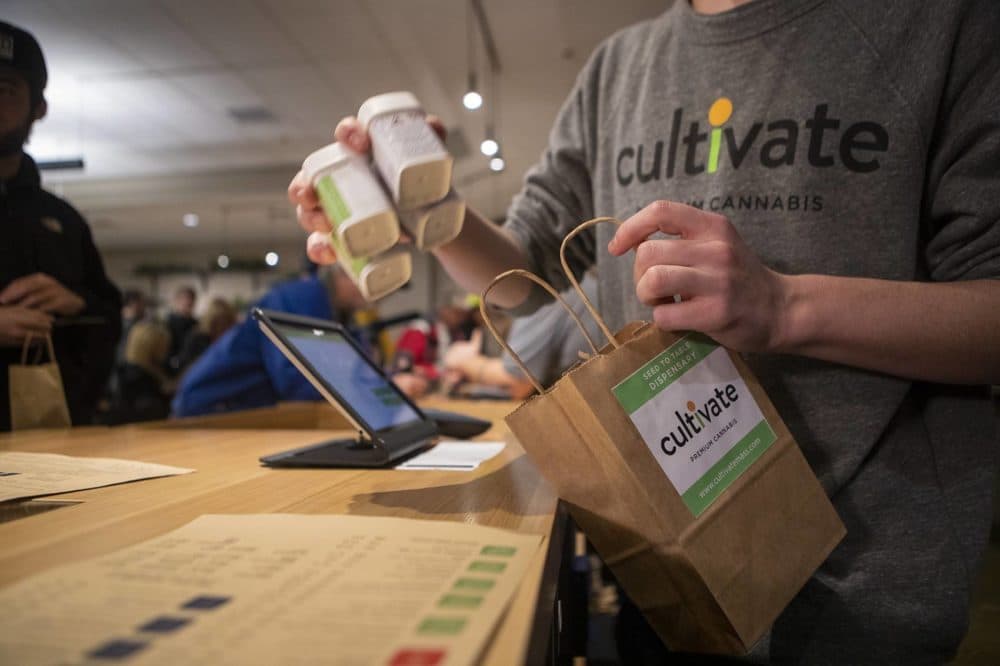Advertisement
Recapping The Year In Marijuana In Massachusetts — And Looking Forward To 2019
Resume
It's been a big year for marijuana in Massachusetts. A year ago, anyone over 21 could legally light up a joint — there just wasn't anywhere to (legally) buy one.
Now, five retail marijuana shops are open with more expected to come on board soon.
Here's a look back at the year in weed, and a look ahead of what to expect in 2019.
First day of sales
The single biggest date on the calendar this year was Nov. 20, when two shops made the first sales of legal, licensed, recreational cannabis to anyone over 21 — no medical marijuana card necessary.
People waited for hours in cold, drizzly weather to buy what they felt like was a piece of history from the two shops that initially opened. Cultivate in Leicester and New England Treatment Access in Northampton combined sold more than $2.2 million in recreational product in the first week in operation.
Since then, the biggest complaint about the stores has been traffic. With only a few pot shops open there's been a lot of foot and vehicle traffic in those towns.
What did it take to get there
Lots of meetings and regulations by the Cannabis Control Commission — the body charged with fostering the creation of the marijuana industry here in Massachusetts — over the last year-plus. Staff needed to be hired, inspectors needed to be trained, a seed-to-sale tracking system needed to be implemented and much more needed to be done before the first sale was made.
People hoped the system would be in place by July 1, the earliest date sales could begin. But the Cannabis Control Commission warned it could take some time as they set up the regulatory framework behind the industry.
Commission executive director Shawn Collins compared the process to building a fire truck on the way to the fire.
Bumps in the road
Back in January, the new U.S. attorney for Massachusetts, Andrew Lelling, freaked a lot of people out when he said he wouldn't rule out prosecuting marijuana businesses operating in legal states like Massachusetts. Marijuana is still illegal under federal law, and people worried he would start cracking down on state-sanctioned businesses.
But a few months later, he clarified he wouldn't be focusing on state-regulated marijuana businesses. And most people in the industry breathed a sigh of relief.
There has also been some concern over host community agreements. These are the contracts between the marijuana businesses and the municipalities they are operating in. Some towns are asking for more than the 3 percent of revenue they are allowed to under current law, while some have said the agreements are making it harder for businesses — especially small, less-well-funded ones — to get the OK to operate.
On tap for 2019
Expect more stores to open up. There are more than two dozen retail shops with a provisional or final license, meaning they're the closest to opening. And there are many more cultivators, product manufacturers, labs and other establishments also in the pipeline. (We've mapped all those businesses here.)
This year's focus has been on getting retail shops open. But there is so much more to tackle. On the regulation side, there is debate over what is called social use. Massachusetts could have bars or clubs for cannabis, where you purchase and consume your marijuana on site, or BYOC type facilities — bring-your-own-cannabis.
After outcry from legislators — including the governor — the entire issue of social use has been tabled for now, promised to be pick up next year.
Cannabis cafes and similar types of businesses are said to be an easier port of entry for would-be entrepreneurs, especially those without a lot of startup money, like individuals in low-income neighborhoods or those disproportionately impacted by the war on drugs.
Massachusetts' law has provisions to help people affected by the war on drugs. So far, that has meant letting so-called economic empowerment applicants get to the front of the line, but there have not been any business owners who have fit the bill or even get to the point where they would be licensed.
There has not been one minority-owned business licensed so far, which worries Cannabis Control Commissioner Shaleen Title.
"For me, the nightmare scenario is we wake up in a year, we have a fully functioning industry, and we find that we did not meet our mandate, we did not meet our goal to have a diverse industry and it will be too late to change it," she told Boston city councilors at a hearing in December.
Boston and other cities are trying to figure out how to make sure that doesn't happen.
What we're watching for in 2019
Those host community agreements are netting cities and towns 3 percent or more of revenue from the businesses that are open. So you can bet in the next few months, we will be asking those municipalities what they spent their funds on and whether it is directly related to the impact of the cannabis business in their community.
And now that the commission has a couple shops under its belt, how fast can they go through the process, while keeping the integrity of the process in place?
For more updates on the marijuana industry, join WBUR's Facebook group, Green Rush: Cannabis in Massachusetts.
This segment aired on December 24, 2018.

